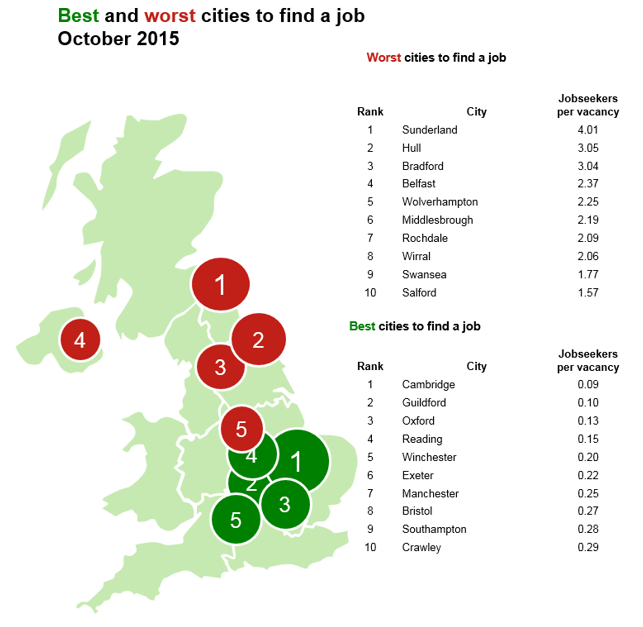 Cambridge had an impressive 315.7 patents published per 100,000 residents
Cambridge had an impressive 315.7 patents published per 100,000 residentsNearly three quarters of UK cities are finding it difficult to fill advertised job vacancies, as the number of overall job vacancies increases while the number of job seekers decreases, according to a Training Journal report.
Forty-one out of 56 UK cities do not have enough applicants to fill advertised roles in September, the jobs board Adzuna revealed. With more than 1.1 million vacancies in September (up 30 per cent from September 2014), the number of job seekers has fallen to 685,456 – resulting in positions becoming increasingly harder to fill.
More workers are entering part-time and temporary jobs, while some job seekers are turning to self-employment for a regular income – further depleting the number of job hunters looking for permanent positions.
The South of England leads the country with the best job seeker prospects; Cambridge having 0.09 applicants per vacancy. Other places in the South including Exeter, Oxford and Reading also perform well. However job seekers in Wolverhampton face a battle for a new position as the city has 2.25 job seeking applicants per vacancy. The job hunters in the North East similarly face tough competition for each role, with Sunderland the worst place to find a job, with 4.01 applicants per vacancy.

The best and worst places to find a job in October 2015
Andrew Hunter, co-founder of Adzuna, said: “Job competition has fallen to its lowest level since the recession, which should spell good news for those searching for work. But despite the number of positions growing with a new vigour, the significant skills shortage within the labour force means vacancies are increasingly being left empty.
‘Many cities don’t have enough home-grown talent to fill new positions, meaning companies are increasingly relying on workers from elsewhere in the UK, as well as from overseas. For many job seekers, the solution to finding employment is increased mobility. But the traditional migration from North to South needs to be broadened. Flexibility is emerging as a key requirement.
‘With the arrival of Crossrail in the future and ever-extending transport networks set to benefit all regions of the country, migrating to a different city could be the proactive approach to securing work. Graduates in particular should look beyond London and embrace a new appetite for adventure when it comes to work location.
‘There is another solution to the talent drought too: increasing the productivity of the workers we do have. After the recession bit, many job seekers took up part-time roles or ventured into self-employment – meaning much of our workforce is operating at less-than-full capacity. To counteract this, employees may have to start staying in the office longer. Clocking in and out may become a thing of the past. Higher investment in the latest technologies and infrastructure will also help employers to maximise the output of exiting talent. Retraining staff will play a key part in improving productivity too.”
The UK unemployment rate is at its lowest point since 2008 (at 5.4 per cent in September, according to the Office of National Statistics (ONS)). The average advertised salary decreased to £33,121 in September, down 4.5 per cent compared to twelve months ago.
“Advertised salaries are beginning to dip, alongside the temperature,” added Hunter. “Job seekers are entering a hostile environment as salaries fall sharply across all regions. This is partly due to an increase in seasonal work, as well as the boom in graduate roles – typically seen in autumn. Not only this, salaries are suffering as companies retract from the war on talent and focus on upskilling workers and offering valuable apprenticeship schemes, in-house training and opportunities – all of which mean less money left over for advertised salaries.”
Get The Recruiting Times FREE every Monday – SUBSCRIBE NOW
Recruiters love this COMPLETE set of Accredited Recruitment & HR Training – View Training Brochure








